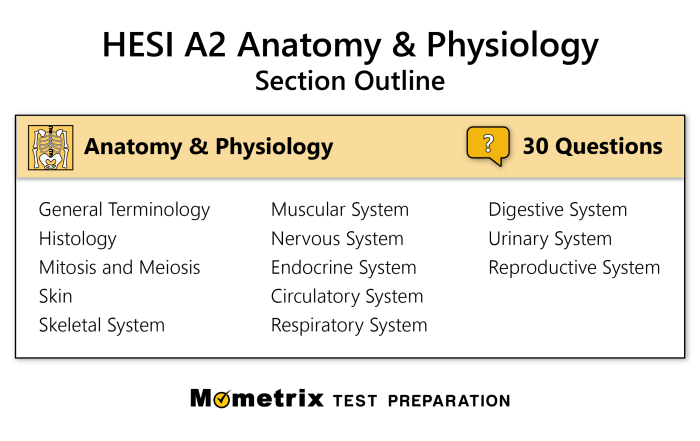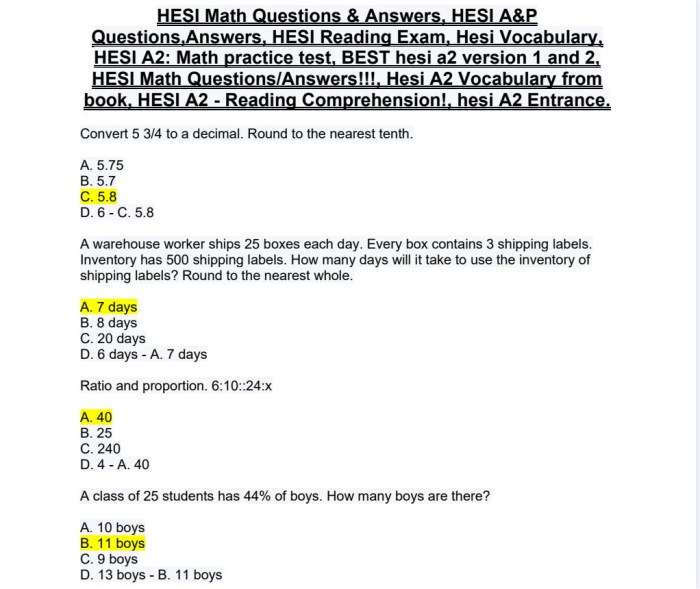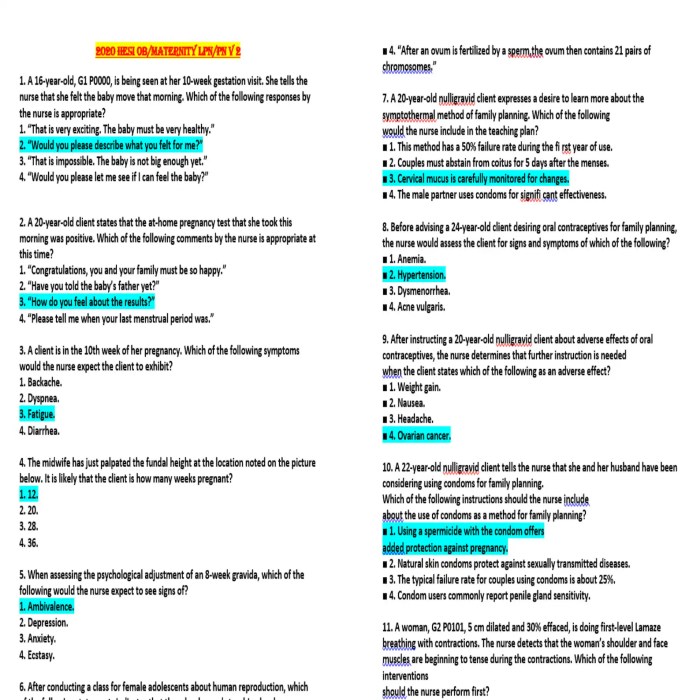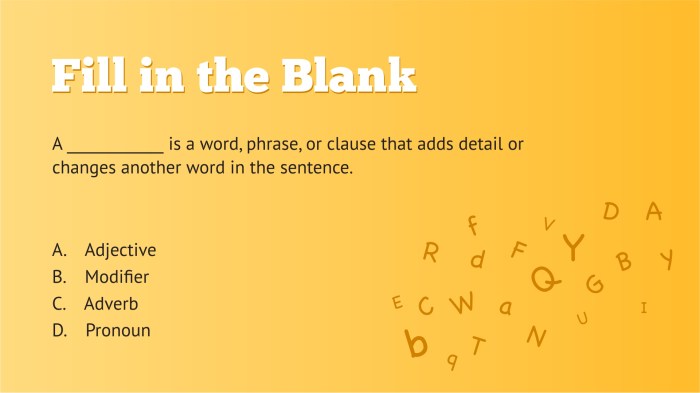Embark on a comprehensive journey with HESI Mobility Exam Practice Questions, an indispensable resource meticulously crafted to empower candidates seeking success in the highly consequential HESI Mobility Exam. This all-encompassing guide unravels the intricacies of the exam, equipping you with a robust foundation of knowledge and practice.
Delve into the exam’s structure, question types, and content, gaining an unparalleled understanding of the challenges that lie ahead. Engage with a vast array of practice questions that mirror the actual exam’s difficulty level, honing your skills and building confidence.
Exam Overview

The HESI Mobility Exam is a standardized test designed to assess the knowledge and skills of nursing students who are preparing to enter the workforce. The exam is used by nursing schools and healthcare employers to evaluate candidates’ readiness for practice.The
HESI Mobility Exam consists of six sections:
- Fundamentals of Nursing
- Medical-Surgical Nursing
- Pediatric Nursing
- Obstetrics
- Psychiatric Nursing
- Pharmacology
Each section includes multiple-choice questions, fill-in-the-blank questions, and drag-and-drop questions. The exam is timed, and candidates have a limited amount of time to complete each section.
Practice Questions
The HESI Mobility Exam is a comprehensive assessment that evaluates candidates’ knowledge and skills in various aspects of patient care. To prepare effectively for this exam, it is crucial to practice with questions that accurately represent the difficulty level and content of the actual test.
Medical-Surgical Nursing
- Assess a patient’s risk for falls and develop appropriate interventions.
- Manage a patient with a wound infection, including wound care and antibiotic administration.
- Administer medications safely and effectively, including IV medications and pain management.
Fundamentals of Nursing
- Perform a comprehensive patient assessment, including vital signs, pain level, and neurological status.
- Implement measures to prevent pressure ulcers and maintain skin integrity.
- Provide patient education on health promotion and disease prevention.
Pediatric Nursing
- Assess a child’s growth and development and identify potential developmental delays.
- Administer medications to children safely and effectively, considering age-appropriate dosing and routes.
- Provide care for a child with a fever, including monitoring vital signs and administering antipyretics.
Maternity Nursing, Hesi mobility exam practice questions
- Monitor a laboring patient’s progress and assess fetal well-being.
- Provide postpartum care for a mother and newborn, including breastfeeding support and newborn assessment.
- Recognize and manage complications during labor and delivery, such as hemorrhage and preeclampsia.
Critical Care Nursing
- Monitor a patient on mechanical ventilation and adjust ventilator settings as needed.
- Interpret electrocardiograms and identify arrhythmias, such as atrial fibrillation and ventricular tachycardia.
- Manage a patient with sepsis, including fluid resuscitation and antibiotic administration.
Answer Explanations

This section provides comprehensive explanations for each practice question, including the correct answer and the rationale behind it. We will also discuss common misconceptions and offer strategies for answering similar questions.
Correct Answer and Reasoning
For each practice question, we will clearly state the correct answer and explain the reasoning behind our choice. We will use evidence from the question and relevant nursing concepts to support our answers.
Common Misconceptions
We will identify common misconceptions that students may have when answering mobility exam questions. We will provide clear explanations to dispel these misconceptions and help students develop a better understanding of the concepts being tested.
Strategies for Answering Similar Questions
We will offer practical strategies for answering similar mobility exam questions. These strategies will help students develop a systematic approach to answering questions and increase their confidence in their ability to pass the exam.
Study Tips

Preparing for the HESI Mobility Exam requires effective study strategies and techniques. These tips can help you optimize your time and maximize your understanding of the material.
Time Management
Plan your study schedule in advance and allocate specific time slots for studying. Break down large amounts of material into smaller, manageable chunks to avoid feeling overwhelmed. Use a timer to track your study sessions and take breaks to stay focused.
Note-Taking
Take notes while reading the material or attending lectures. Use active listening techniques to identify key concepts and organize your notes logically. Consider using different colors, symbols, or abbreviations to make your notes more visually appealing and easier to review.
Reviewing Material
Regularly review the material you have covered. Spaced repetition, or reviewing material at increasing intervals, can help improve retention. Use practice questions, flashcards, or self-testing to assess your understanding and identify areas that need more attention.
Exam Resources: Hesi Mobility Exam Practice Questions

The HESI Mobility Exam is a challenging test, but it is also an important one. By preparing adequately, candidates can increase their chances of success. In addition to the resources provided by the testing organization, there are a number of additional resources available to help candidates prepare for the exam.
Study Guides
There are a number of study guides available that can help candidates prepare for the HESI Mobility Exam. These guides typically provide a comprehensive review of the material covered on the exam, as well as practice questions and answers. Some popular study guides include:
- HESI Mobility Exam Study Guide by Kaplan
- HESI Mobility Exam Study Guide by Mometrix
- HESI Mobility Exam Study Guide by Test Prep Review
Online Courses
There are also a number of online courses available that can help candidates prepare for the HESI Mobility Exam. These courses typically provide video lectures, practice questions, and other resources. Some popular online courses include:
- HESI Mobility Exam Prep Course by Kaplan
- HESI Mobility Exam Prep Course by Mometrix
- HESI Mobility Exam Prep Course by Test Prep Review
Practice Tests
Practice tests are a great way to assess your readiness for the HESI Mobility Exam. By taking practice tests, you can identify areas where you need to improve your knowledge and skills. There are a number of practice tests available online, including:
- HESI Mobility Exam Practice Test by Kaplan
- HESI Mobility Exam Practice Test by Mometrix
- HESI Mobility Exam Practice Test by Test Prep Review
In addition to these resources, there are a number of reputable websites and organizations that provide reliable information about the HESI Mobility Exam. These include:
- National Council of State Boards of Nursing (NCSBN)
- American Association of Colleges of Nursing (AACN)
- National League for Nursing (NLN)
Question Bank
What is the purpose of the HESI Mobility Exam?
The HESI Mobility Exam assesses the knowledge and skills of nursing students and graduates in the areas of patient mobility and safe patient handling.
What types of questions are included in the HESI Mobility Exam?
The exam consists of multiple-choice questions covering topics such as patient assessment, safe patient handling techniques, mobility equipment, and legal and ethical considerations.
How can I prepare for the HESI Mobility Exam?
Utilize practice questions, study guides, and online courses to familiarize yourself with the exam content and question types. Additionally, focus on developing strong critical thinking and problem-solving skills.